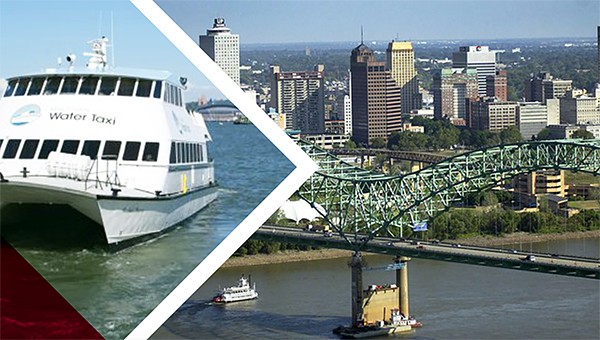Many leaders have imagined the whir of outboard motors pushing water taxis through the Wolf River Harbor for at least six years, but a new state report douses that dream with a cool glass of muddy river water.
High capital costs and heavily subsidized operations highlight the report from the Tennessee Department of Transportation (TDOT). But the death knell for the project, which Riverfront Development Corp. (RDC) president Benny Lendermon said he heard at least six months ago, was the disqualification of amphibious vehicles (or duck boats) from the project.
Water taxis first appeared in paper here in 2010, a part of the Mud Island River Park Land Use Study. They popped up again two years later in the Uptown West Master Plan. The very basic idea was to run the taxis up and down the Memphis riverfront, connecting key sites.
Riders, mainly tourists, would catch one of three water taxis (large pontoon boats with outboard motors) at Beale Street Landing, according to the report authored by national transportation consulting firm TransSystems. The taxi would make a stop at Mud Island and continue to a landing dock under the A. W. Willis Bridge for walkable access to Bass Pro Shops at the Pyramid.

Some leaders have long dreamed of having water taxis here.
This plan would require taxi riders to enter and exit the boats and traverse walkways, which would all have to meet standards set forth in the Americans with Disabilities Act (ADA). This, Lendermon said, increased the cost of the project considerably and put it out of reach.
He imagined a water taxi service that used large amphibious vehicles, commonly called duck boats. Using the boats would only require riders to enter and exit the vehicles once and without the need for dock landings. But the study said federal funds would not support the vehicles because they are considered tourist vehicles and not strictly for transportation services.
“The bottom line is if you’re going to say amphibious vehicles are not allowed and not funded by the Federal Transit Authority, then there’s no way a water taxi system is feasible in Memphis,” Lendermon said.
The study projects about 21,000 one-way trips per year. One-way tickets would cost $5. Round-trip tickets would be $7.
Here’s where the report drops a cold bucket of reality. Building the dock landings, buying the boats, and more would cost between $4 million and $12 million. That kind of money would get the project off the ground, and then it would cost about $660,000 a year to run it.
Furthermore, the study says the water taxi service would never become a self-sustaining business venture. Each one-way trip (from Beale Street Landing to Bass Pro or back the other way) would require a subsidy of $26.63, or about $580,300 annually.
If fares from taxi riders were to cover the project’s entire cost, one-way tickets would have to be $31, and there would be no round-trip tickets available, the study says. This, of course, would severely limit ridership and would likely make the project unfeasible.
Lendermon said the study, which took 18 months to complete but no local money, ends the conversation of a Memphis water taxi service.